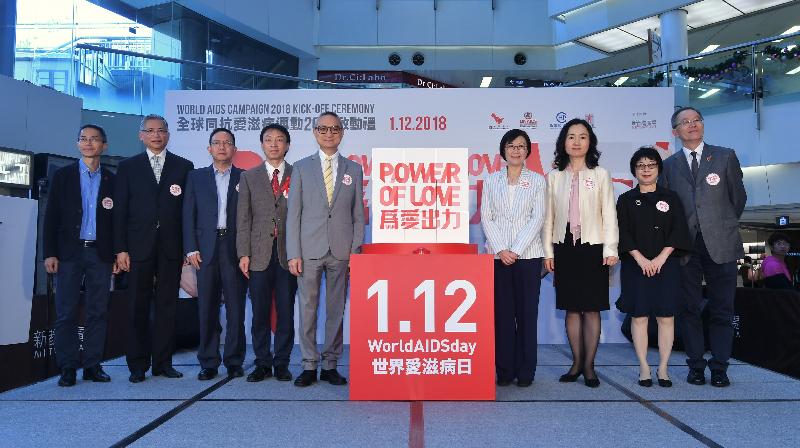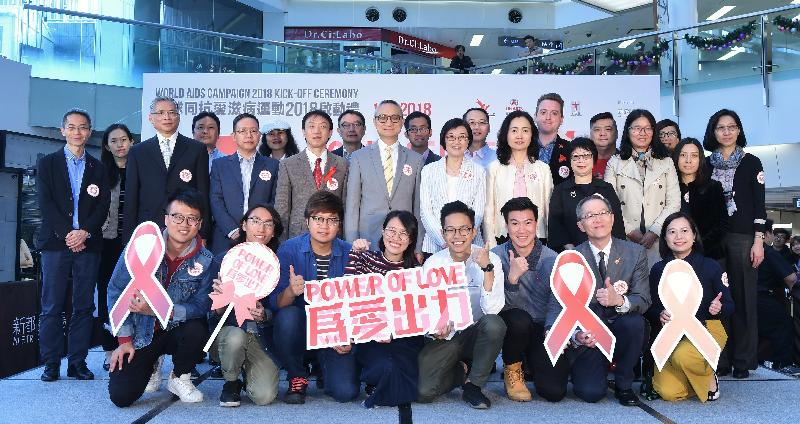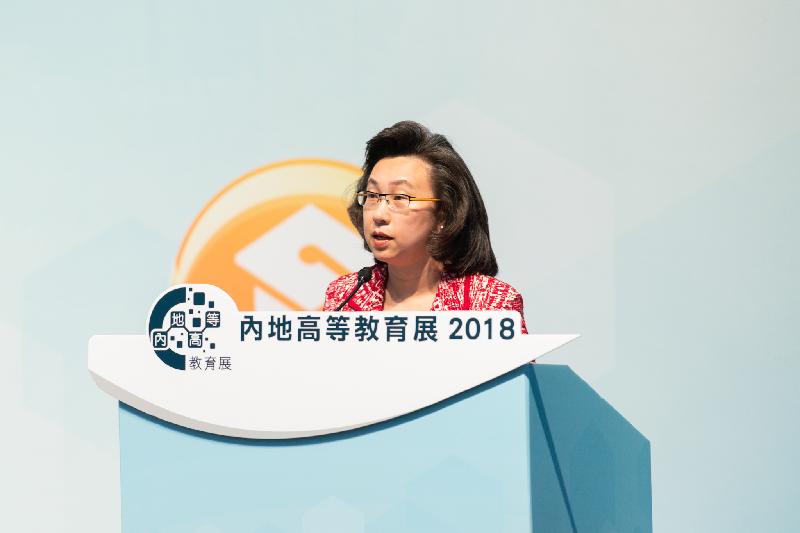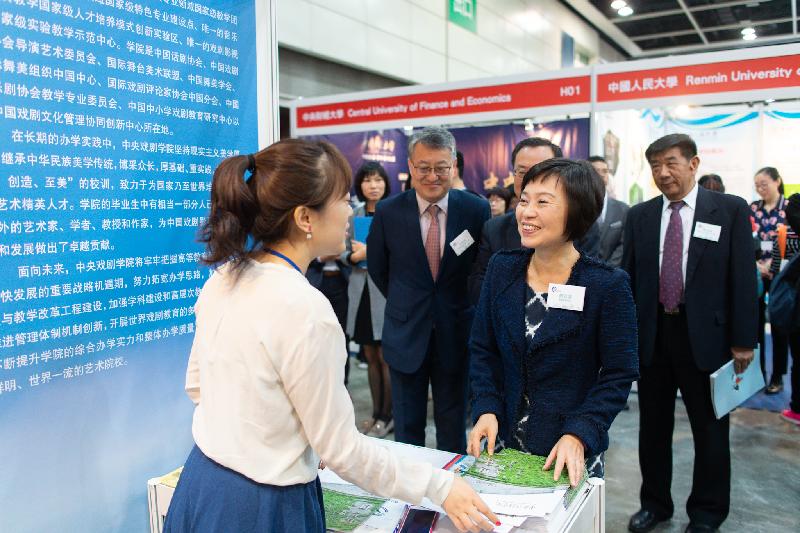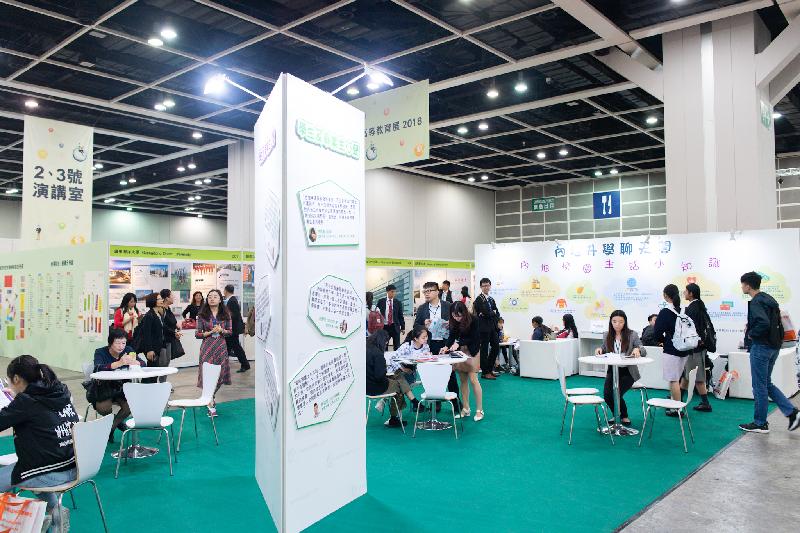Public urged to deepen understanding on AIDS prevention (with photos)
The Department of Health (DH) today (December 1) held the Power of Love: World AIDS Campaign 2018 Kick-off Ceremony in support of World AIDS Day, which takes place on December 1 every year. The ceremony aims to deepen public understanding on Human Immunodeficiency Virus/Acquired Immune Deficiency Syndrome (HIV/AIDS) and its prevention, as well as appealing to them to help support people living with HIV.
Officiating at the ceremony, the Under Secretary for Food and Health, Dr Chui Tak-yi, said, "In the first three quarters of 2018, 452 additional cases of HIV infections were recorded. Among them, nearly 30 per cent of the cases were aged 20 to 29, the highest proportion among all age groups, with the majority were men who had sex with men (MSM). It is particularly worrying that the public’s awareness and that of young people in particular of AIDS prevention remain inadequate, failing to protect themselves from peer influence on unsafe sex and drug abuse." He stressed the importance of proper use of condoms for safer sex.
Dr Chui said that HIV infection can now be treated and controlled as a chronic disease. HIV testing facilitates early detection of HIV-infected people, and early treatment prolongs survival and improves quality of life. He encouraged infected people to seek treatment and care as early as possible.
  Dr Chui added that the DH and a number of non-governmental organisations (NGOs) provide free, anonymous and completely confidential HIV rapid testing services. He appealed to high-risk groups, including MSM, to undergo testing every year, while anybody engaged in sexual activity should consider HIV testing if they have not been tested before, in order to act responsibly towards themselves and their partners.
  To raise the public's understanding and awareness towards AIDS, in addition to organising the ceremony today, the DH's Red Ribbon Centre (RRC) has organised a series of promotional and public education activities under the theme "Power of Love" to reach out to the public via social platform, video and roadshow sessions at various community spots.
  The RRC will hold a series of activities in December to disseminate health messages to the public on sex and AIDS. The DH hopes that the public will attend and support these events, as well as share the message on prevention of AIDS and help eliminate the negative stereotypes about the disease.
  Promotional activities under the theme "Power of Love" include inviting key opinion leaders from various sectors of the community to spread the message about HIV prevention and show support to people living with HIV through social media platforms; setting up roadshow sessions in collaboration with an NGO at popular nightlife hot spots in Hong Kong and Kowloon to promote safer sex and early testing for prevention of HIV transmission; and producing a video to raise public awareness on the importance of early testing and treatment for HIV.
Designated as a Joint United Nations Programme on HIV/AIDS (UNAIDS) Collaborating Centre for Technical Support, the DH's RRC, with a mission to facilitate and enhance the community's response to HIV/AIDS, has already been closely working with AIDS service NGOs for many years to disseminate the World AIDS Campaign.
  Other officiating guests today were the Director of Health, Dr Constance Chan; the Vice Director of the Institute of HIV/AIDS Control and Prevention of the Guangdong Provincial Center for Disease Control and Prevention, Dr Yang Fang; the Deputy Ombudsman of the Health and Family Planning Commission of Shenzhen Municipality, Dr Zhang Yingji; the Head of Center for Disease Control and Prevention of Macao, Dr Lam Chong; the Chairperson of the Hong Kong Advisory Council on AIDS, Dr Patrick Li; the Chairman of the Council for the AIDS Trust Fund, Dr Thomas Lai; the Chairperson of the RRC Management Advisory Committee, Ms Victoria Kwong; and the Controller of the Centre for Health Protection of the DH, Dr Wong Ka-hing.
The public may visit the DH's Virtual AIDS Office (www.aids.gov.hk), the RRC page (www.rrc.gov.hk), the AIDS Hotline website (www.27802211.com) and the Gay Men HIV Information website (www.21171069.com) for more information on HIV/AIDS.

